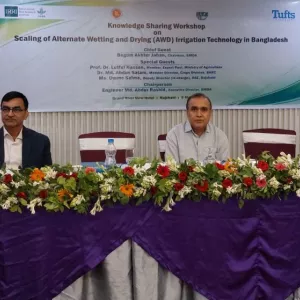Prepaid irrigation cards and AWD may unlock a more sustainable rice farming future for Bangladesh
Prepaid irrigation card usage by farmers in the Barind area of Bangladesh can facilitate wider adoption of Alternate Wetting and Drying (AWD) practices in rice farming, making rice cultivation more sustainable and cost-effective. May 9, 2024, Rajshahi, Bangladesh : Bangladesh is one of the most vulnerable countries to climate change. It has experienced more than 185 adverse weather events over

Prepaid irrigation cards and AWD may unlock a more sustainable rice farming future for Bangladesh
Prepaid irrigation card usage by farmers in the Barind area of Bangladesh can facilitate wider adoption of Alternate Wetting and Drying (AWD) practices in rice farming, making rice cultivation more sustainable and cost-effective.
May 9, 2024, Rajshahi, Bangladesh : Bangladesh is one of the most vulnerable countries to climate change. It has experienced more than 185 adverse weather events over the past 20 years . With more intense heat waves occurring, groundwater table declining and water scarcity increasing, more sustainable rice-based agri-food systems practices are needed to conserve much needed natural resources. Climate-smart agricultural practices like AWD stand to save irrigation water, mitigate climate change effects, ensure sustainability of rice farming, and maintain food and nutrition security for farmers.
To this end, the International Rice Research Institute (IRRI); the Tufts University, USA; and the Barind Multipurpose Development Authority (BMDA) completed a joint knowledge-sharing workshop to understand the status, challenges, and opportunities of using prepaid irrigation cards to improve water use efficiency in rice production in the Barind areas, and discuss policy opportunities and implications that factor in the wider promotion AWD irrigation technology in the country.
In the Barind areas of Bangladesh, the BMDA operates deep tubewells through a prepaid card for irrigation for farmers, which allows the farmers to draw groundwater for irrigation and pay according to the volume of water used through prepaid cards. However there are variations in the prepaid card usage across villages.
The workshop is underpinned by the research project titled “Using Experimental Evidence to Scale up AWD Technology for Rice Production in Bangladesh”, which is being implemented by IRRI and Tuft University in Bangladesh since 2021. The project aims to generate evidence for policy makers and development practitioners…

